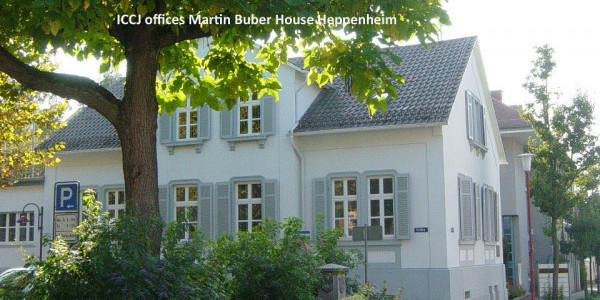The ICCJ welcomes a new President and Executive Board
Interview: Conseil Représentatif des Institutions Juives de France (CRIF) - Liliane Apotheker
01/09/2021 | Na stronie od 01/09/2021

Source: ICCJ
Anette Adelmann, ICCJ General Secretary
At their Annual General Meeting the ICCJ member organizations elected a new Executive Board for a tenure of three years. Chaired by the new ICCJ President Liliane Apotheker the Board took up its work on July 8.
The members of the new ICCJ Executive Board (elected June 27, 2021):
- Liliane Apotheker (France) - President
- Rev. Dr Michael Trainor (Australia) - 1st Vice-President
- Rabbi Samuel Szteinhendler (Chile) - 2nd Vice-President
- Dr Abi Pitum (Germany) - Treasurer
- Dr Pavol Bargár (Czech Republic) - Board member
- Dr Margaretha Hackermeier (Germany) - Board member
- Ophir Yarden (Israel) - Board member
Interview: Conseil Représentatif des Institutions Juives de France (CRIF) - Liliane Apotheker
[First published in French, July 2, 2021, on the CRIF website. The Conseil Représentatif des Institutions Juives de France (= Representative Council of Jewish Institutions of France) is the umbrella organization of more than 70 Jewish organizations and institutions in France]
Le CRIF: Liliane Apotheker, tell us a few words about yourself, what defines and characterizes you.
Liliane Apotheker: I was born in Antwerp, Belgium, to parents who had survived the Holocaust, who found refuge in that country, in a Jewish community with solid institutions including an exceptional Jewish school, the Tachkemoni school. I was a member of a Zionist youth movement, the HaNoar HaTsioni, all my younger years. I learned Hebrew in school from kindergarten. Belgium is a polyglot country, I am the daughter of immigrants, it allowed me to grow up learning several languages: French, German, Yiddish, Flemish, Hebrew and English. At school, I did a lot of Latin, not knowing that one day it would be useful for me to possibly speak with the Pope [laughs]. I studied literature at the Hebrew University in Jerusalem and lived in Israel for a long time.
Le CRIF: Where did your commitment to dialogue between Jews and Christians come from? You were a long time member of the Steering Committee of the Amitié Judeo-Chrétienne de France (AJCF).
Liliane Apotheker: When my children were young, we lived in Saint-Germain-en-Laye. When organizing a Bible exhibition hosted by a committee of Protestant and Catholic organizers, I represented the Jewish voice. Back then, thirty years ago now, it was not as obvious as it is today. I realized that Christians were very interested and that we had a duty to respond to this curiosity and interest. It all started there for me and it is with emotion that I think back to my friends, priests and pastors of my early days. After my AJCF years, an organization I'm still very attached to, I became involved with ICCJ and that quickly became dominant. It is wonderful to be able to speak to Jews and Christians all over the world who are all engaged in the same process.
Le CRIF: In your opinion, can inter-religious dialogue, beyond cultivating the virtue of friendship, influence our societies?
Liliane Apotheker: It has the duty and even I would say the mission to do so. The culture of dialogue teaches us listening, respect for the place of others, critical introspection, and in fact it is a practice of an exercise in peace, not irenic but, on the contrary, demanding to the extreme.
Le CRIF: France is especially unique in the world in having chosen secularism as a way of life, excluding religious symbols from the public space. You who know the inter-religious dialogue in other countries, since you chair the international network that is the ICCJ, do you think that this (secularist) model is a good one or it is too restrictive?
Liliane Apotheker: It is at the same time both good and restrictive when expressed in its absolutist and militant form. Abroad, this French distinctiveness is poorly understood and perceived as an attack on freedom, which it is not, in my opinion. Secularity protects us all; it is also the only system that upholds secular humanism and let us not forget that we live in a society which is increasingly secular in our Western countries. One cannot imagine not including those who wish to participate in dialogue. A lot of people are on a quest for meaning, a lot of Jews are secular, a lot of Christians are of Christian culture but are not necessarily practicing and we also see this in Muslim circles.
Le CRIF - What can we wish for you in your new role?
Liliane Apotheker: Energy, creativity, courage and the miraculous manna: the financial means to carry out important projects.